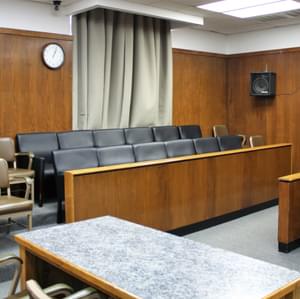
Brandonrush, CC0, via Wikimedia Commons
On December 12, 2023 U.S. District Judge Michael P. Mills overturned Terry Pitchford’s death sentence and ordered Mississippi to retry him in 6 months or release him from custody. Judge Mills found that the original trial judge failed to allow the defense to properly challenge the exclusion of Black jurors by now-retired District Attorney Doug Evans, the same prosecutor who prosecuted Curtis Flowers. “This court cannot ignore the notion that Pitchford was seemingly given no chance to rebut the state’s explanations and prove purposeful discrimination,” Judge Mills wrote.
Mr. Pitchford was the youngest prisoner on Mississippi’s death row when he was sentenced to death for killing grocery store owner Reuben Britt at just 18 years old. At his trial, a jury pool of 126 people was initially summoned (40 Black, 84 white, one Hispanic, and one unknown). The trial judge first dismissed jurors for statutory causes and other reasons unrelated to the case, leaving 96 potential jurors (35 Black and 61 white). Following voir dire, the judge dismissed another 52 jurors for cause, including 30 Black jurors for their views on the death penalty, resulting in a pool of 41 potential jurors (36 white and five Black). The State used seven preemptory strikes and excluded four Black jurors for reasons deemed “race-neutral” by the trial judge, who didn’t allow the defense to challenge any of the claims.
Batson v. Kentucky (1986) held that it is unconstitutional to exclude jurors based on their race. A defendant who wishes to challenge the prosecution’s use of peremptory strikes to exclude Black jurors may object and require the prosecution to state a race-neutral reason for the strikes. The defense then must have an opportunity to rebut the reason and prove intentional discrimination. In Mr. Pitchford’s case, the trial court denied the defense that opportunity.
In his order, Judge Mills said his finding was influenced by District Attorney Evans’ history of excluding Black jurors. In Curtis Flowers’ case, Evans prosecuted Mr. Flowers six times and illegally excluded Black jurors in several of those proceedings. Mr. Flowers’ conviction was overturned by the U.S. Supreme Court in 2019. In Flowers v. Mississippi, Justice Brett Kavanaugh wrote “[t]he State’s relentless, determined effort to rid the jury of black individuals strongly suggests that the State wanted to try Flowers before a jury with as few black jurors as possible, and ideally before an all-white jury.” In considering Mr. Pitchford’s appeal, Judge Mills found that the Mississippi Supreme Court should have taken this history into consideration, writing “The court merely believes that it should have been included in a ‘totality of the circumstances’ analysis of the issue.”
Judge overturns Mississippi death penalty case, says racial bias in picking jury wasn’t fully argued, Associated Press, December 17, 2023; Lici Beveridge, Man on death row, tried by same prosecutor in Curtis Flowers’ case, will get a new trial, Clarion Ledger, December 13, 2023
Read the court order, here.
Official Misconduct
Jul 19, 2024

New Filings Allege Georgia Prosecutor Withheld Critical Evidence of Plea Deal with Co-Defendant from Warren King
Official Misconduct
Jun 11, 2024

